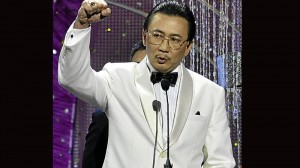Aguinaldo’s eventful life gets view-worthy depiction
We’ve gotten so inured to the fluff and commercial gross-oriented gloss of the annual Metro Manila film fest that it’s quite a surprise to see that a historical film, “El Presidente,” has managed to get into the festival’s usual fantasy, melodramatic and otherwise escapist list of featured photoplays.
Mark Meily’s film on the controversial life and times of Gen. Emilio Aguinaldo may sometimes bite off more than it can chew, but we much prefer to see a production that’s trying to “over-achieve” rather than the usual flicks that settle for lazy formulaic treatments that dumb viewers down.
Based as it is on Aguinalso’s own memoirs, “El Presidente” may be too subjective to be the definitive word on the subject, so we hope that the country’s historians will watch the movie right away and weigh in with their evaluations of its version’s veracity and reliability.
Before those evaluations are submitted, we must temporarily take Aguinaldo’s version at face value, and for the nonce conclude that he lived a life that was colorful and full, indeed—and decidedly worthy of the extensive and extended treatment that it gets in Meily’s film.
We admire “El Presidente” for its scope and detail and for its ability to touch on the many factors and forces that come into play in the escalating drama of an emerging country’s revolution to achieve freedom after centuries of colonial rule.
Many nationalities are represented in the film’s cast of characters, so it must have been a huge problem finding the right actors to play all those roles! Also difficult to pull off are the movie’s many “big” scenes involving scores and scores of combatants and civilians.
Perhaps most daunting of all is the task of making thematic sense of the many conflicting motives and “contradictory” strings of narrative that came into play to make up the warp and woof of the production’s storytelling. Despite some flubs and missteps in terms of tempo and focus, the film is generally successful in this regard.
Chronology
The flubs include some errors in terms of believable chronology, like the fact that Aguinaldo and his fellow revolutionary generals, who were relatively young men when they became leaders, are played here by middle-aged actors like Jeorge “ER” Ejercito and Cesar Montano. This robs their characterizations of the impudent verve and vitality they need to effectively recreate the halcyon days of revolution.
Also distracting is the awkward Spanish spoken by some actors, as well as bad aging makeup and some too contemporary speech patterns and behavior on other actors’ part.
More significantly, the introduction of Nora Aunor’s character toward the latter part of the film draws titters because she obviously looks too mature for the simpering señorita she portrays. Of course, her creditable acting chops kick in soon after to save the day, but the “harm” has already been done.
Even more pertinently, despite his most admirably resolute efforts, Ejercito is unable to dynamically and believably vivify Aguinaldo, especially in his younger years.
All told, however, “El Presidente” is view-worthy, and should be seen and discussed by all interested viewers—especially the best and most reliable historians, whose verdict as to its veracity we await.
